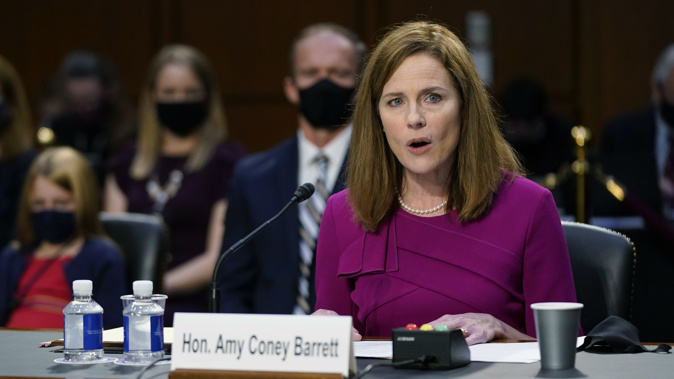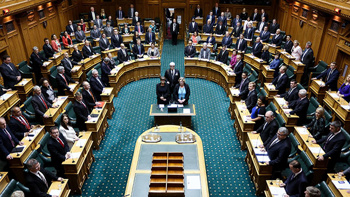
The first day of confirmation hearings for President Donald Trump's Supreme Court nominee Amy Coney Barrett featured plenty of fiery speeches -- many of them aimed at next month's presidential election rather than the nominee herself.
Democrats focused more on the Affordable Care Act, and Trump's backing of a lawsuit that would invalidate the law -- a hearing scheduled for November 10. Republicans defended the decision to confirm Barrett so close to the election and sought to preempt any questions about her Catholic faith, mainly by criticizing Democratic comments from 2017.
In fact, viewers might be forgiven if they forgot at times that this was a Supreme Court confirmation rather than a political convention.
Here are five takeaways from day one of the Senate Judiciary Committee hearings:
It's all over but the politicking
Judiciary Chairman Lindsey Graham acknowledged the elephant in the room at the outset of a four-day confirmation hearing process: Nobody's mind on the committee is going to be changed by what transpires in the Senate hearing room.
"This is probably not about persuading each other, unless something really dramatic happens," Graham said. "All Republicans will vote yes, and all Democrats will vote no."
As a result, both sides have a clear eye to the election three weeks away as they debate the Supreme Court nominee -- and as they will question Barrett over the next two days.
Four Republicans on the committee, including Graham, are up for reelection next month. And Sen. Kamala Harris of California is the Democratic vice-presidential nominee.
Democrats put their clear focus on the threat Obamacare faces when a Republican-led, and Trump-backed, case to strike it down goes before the Supreme Court just a week after the election. The message that health care was at risk for millions of Americans was one that helped Democrats win over voters during the 2018 election and take back the House.
Republicans, meanwhile, went after Democrats for attacks on Barrett, and in particular her faith -- while frequently citing the bitter 2018 fight over Justice Brett Kavanaugh's confirmation, which helped Republicans in several 2018 Senate contests in red states.
"We all watched the hearings for Justice Kavanaugh," said Republican Sen. John Kennedy of Louisiana. "It was a freak show. It looked like the Cantina Bar scene out of Star Wars."
Dems make a personal pitch to protect health care
Democrats showed a united front and an organized, perhaps surprising, message with posters scattered across their half of the dais showing the faces of people who relied on the Affordable Care Act for their health care.
A Democratic committee aide said the decision to use personal stories stemmed from an effort to to make Barrett's confirmation as tangible to people as possible that focused on "the real-life effects of a Justice Barrett's decisions."
Democrats feel the health care angle, stressing Trump's efforts and the impact of gutting Obamacare, is a clear political winner. Democratic leaders, including presidential nominee Joe Biden, House Speaker Nancy Pelosi and Senate Minority Leader Chuck Schumer agreed on the strategy, according to sources familiar with the discussions.
"They are trying to get a justice onto the Court in time to ensure they can strip away the protections in the Affordable Care Act," Harris said of Republicans. "If they succeed, it will result in millions of people losing access to health care at the worst possible time in the middle of a pandemic."
Democrats also used their health care argument to hit Trump on the Covid-19 pandemic, another key Democratic message heading into the November election. Sen. Amy Klobuchar of Minnesota made a personal appeal after her husband tested positive for coronavirus earlier this year.
"He ended up in the hospital for a week on oxygen with severe pneumonia, and months after he got it, I find out the President knew it was airborne but he didn't tell us," Klobuchar said.
Asked about the Democrats' unity after the hearing, Illinois Sen. Dick Durbin responded: "It's a bit surprising yeah?"
Republicans look for openings to discuss religion
Republicans in their opening statements criticized Democrats for previous questions about Barrett's Catholic faith and for stories about her association with the Christian group People of Praise.
"There are places where this committee has acted like it's the job of the committee to delve into people's religious communities. That's nuts," said Sen. Ben Sasse, a Nebraska Republican.
At Monday's hearing, however, it was only the Republicans, not Democrats, discussing religion. Barrett also nodded to her religion in her opening statement, saying she believes in the power of prayer.
Still, Republicans had plenty of fodder from past hearings to knock Democrats over, including Barrett's 2017 confirmation hearing for the federal appeals court, such as when the panel's top Democrat, Sen. Dianne Feinstein of California, said, "the dogma lives loudly within you."
Sen. Josh Hawley, a Missouri Republican, accused Democrats of a "pattern and practice of religious bigotry."
The criticisms tied to faith were more about the two days of questions to follow than the opening day speeches, as Democrats are likely to press Barrett on Roe v. Wade and other abortion cases.
Hawley criticized Sen. Chris Coons, a Delaware Democrat, for saying a previous Supreme Court case, Griswold v. Connecticut, which allowed married couples the right to obtain and use contraception, was in danger of being struck down.
Hawley claimed that the reference was "another hit at Judge Barrett's religious faith, referring to Catholic doctrinal beliefs." But it's a case that has been raised repeatedly at judicial confirmation hearings.
Covid looms over hearing
Three Republican senators have tested positive for coronavirus over the past two weeks, throwing into doubt what appeared to be a sure-thing confirmation.
That danger for Republicans appears to have passed, for now, but the coronavirus threat still loomed over the hearing, as two of the Republicans who tested positive are on the Judiciary Committee.
One of those senators, Thom Tillis of North Carolina, spoke remotely at Monday's hearing. He has said he expects to be there in person on Tuesday. The other senator who tested positive, Mike Lee of Utah, appeared in person on Monday, saying he had been cleared by his doctor to attend.
Democrats attacked Graham for moving forward with the hearing despite the positive tests -- and not requiring tests for all senators on the panel.
"This hearing itself is a microcosm of Trump's dangerous ineptitude in dealing with the Covid pandemic," charged Sen. Sheldon Whitehouse, a Rhode Island Democrat.
Graham defended the hearing, saying that strict health protocols were being followed, arguing he was going to work to do his job just like millions of Americans. The setting meant no members of the public could attend, a break from normal confirmation hearings, and senators were spread out across the cavernous hearing room.
The pandemic-era hearing also meant one other notable distention: Barrett was wearing a black mask throughout the senators' opening statements. Other Supreme Court nominees have needed to keep a straight face while they are often attacked, but Barrett's expressions were masked.
Barrett emphasises experience with Scalia
Monday's hearing ended with Barrett's own opening statement, where she discussed clerking for the late Justice Antonin Scalia and what her background would bring to the court, including that she would be the first mother of school-aged children to be a justice and the only sitting justice who didn't graduate from Harvard or Yale Law School.
Barrett generally discussed her legal philosophy, which reflects that of Scalia, her mentor and a conservative anchor of the high court for years. "The policy decisions and value judgments of government must be made by the political branches elected by and accountable to the people," Barrett said.
She also touched on the discussion surrounding her religion at the conclusion of her statement. "I believe in the power of prayer, and it has been uplifting to hear that so many people are praying for me," Barrett said.
Monday's hearing was a day of scripted rhetoric with speeches from senators and the nominee. The real action begins Tuesday with questions.
Senators will each get a half-hour to question Barrett on Tuesday and Wednesday, with Republicans and Democrats alternating turns. Then they will get another 20 minutes for a second round. With 22 senators on the panel, both days will go into the evening, representing Barrett's toughest test before her confirmation to the high court.
text by Jeremy Herb, CNN
Take your Radio, Podcasts and Music with you









